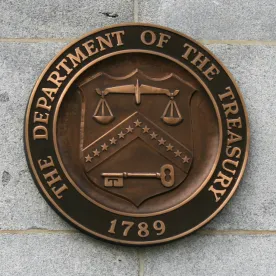On February 9, the US Department of the Treasury (Treasury) released additional proposed regulations implementing the benefit suspension provisions of the Multiemployer Pension Reform Act of 2014 (MPRA).
The proposed regulations address MPRA’s rule for multiemployer plans in “critical and declining” status that includes benefits attributable to a participant’s service with any employer that has (1) withdrawn from the plan in a complete withdrawal, (2) paid its full withdrawal liability, and (3) assumed liability, pursuant to a collective bargaining agreement, for providing benefits to participants and beneficiaries that is equal to any benefits for such participants and beneficiaries reduced as a result of the financial status of the plan.
Importantly, these proposed regulations do not affect the larger community of multiemployer pension plans or employers that contribute to them. They are exclusively important to the Central States, Southeast and Southwest Areas Pension Fund (CSPF) and its largest contributing employer, United Parcel Service Inc. (UPS).
The proposed regulations trace their genesis to a 2007 labor agreement between UPS and the Teamsters, in which it was agreed that UPS could withdraw from the CSPF for a lump sum payment of $6.1 billion. As part of that agreement, UPS established a new jointly trusteed single-employer pension plan for UPS’s employees who were previously covered under the CSPF. UPS also guaranteed that it would provide benefits to participants and beneficiaries that were equal to any benefits reduced as a result of the financial status of the CSPF (referred to as the “make-whole agreement” in the proposed regulations).
When the US Congress was considering MPRA, UPS anticipated additional CSPF benefit cuts and feared that the UPS plan would be responsible for the “make-whole” benefit guarantee costs if benefit suspensions occurred. UPS lobbied Congress heavily to include a rule that protected UPS employees from benefit suspensions on the grounds that UPS had already fully funded these benefits. UPS was successful in having language included in MPRA that requires benefit cuts for certain defined categories of participants before cuts reach UPS employees.
Under the proposed regulations, CSPF must first apply benefit suspensions to the “maximum extent permissible” to participants with service from an employer that withdrew from the CSPF and failed to pay (or is delinquent in paying) the full amount of its withdrawal liability, before benefit suspensions are permitted to apply to other participants. The benefit liability associated with these participants and employees of a withdrawn employer is commonly known as “orphan liability.”
After cutting the benefits of participants in the “orphan” category to the maximum extent permissible, MPRA requires CSPF to consider suspensions of other non-UPS participants’ benefits. This second category would include participants employed by employers that continue to participate in the CSPF. Under MPRA, CSPF is supposed to suspend benefits for the participants in this second category “before” contemplating any suspensions for UPS employees. In the proposed regulations, however, Treasury explains that the best interpretation of the statute is that a suspension does not need to be applied “to the maximum extent permissible” before any suspension of benefits is permitted for UPS participants. Under the proposed regulations, CSPF would be permitted to suspend the benefits for participants in the second category and UPS employees’ benefits simultaneously, provided that the benefit cuts for the second category are greater than or equal to the cuts imposed on UPS employees. Therefore, if the proposed regulations are adopted as written, UPS will be responsible for making its employees whole for any CSPF benefit suspensions.
The proposed regulations are consistent with the approach CSPF has included in the benefit suspension application it filed with Treasury on September 25, 2015. UPS has vigorously opposed the approach. Comments on the proposed regulations are due by March 15, 2016, and a public hearing is scheduled for March 22, 2016.




 />i
/>i

